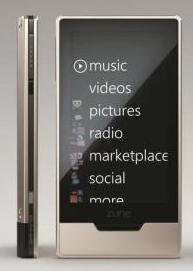Three Devices That Gave Us Better Ways To Do Things We Don’t Want To Do Anymore
Feb 4th, 2010 | By James Lewin | Category: Apple iPad, Commentary, iPods & Portable Media PlayersThe Apple iPad may have debuted to mixed reactions from tech analysts – but it’s clear that Apple’s new tablet computer already has competitors struggling to find ways to stay competitive.
Three examples have cropped up in the last few days:
 Amazon announced that it is buying Touchco – a start-up based in New York that specializes in touch-screen technology. It’s stuck playing catch up now, because the Kindle represents horseless carriage design – new technology that’s weighed down by concepts of the past. You can’t slap a touchscreen on the Kindle and try to compete with the iPad, though, that would just be putting lipstick on a pig.
Amazon announced that it is buying Touchco – a start-up based in New York that specializes in touch-screen technology. It’s stuck playing catch up now, because the Kindle represents horseless carriage design – new technology that’s weighed down by concepts of the past. You can’t slap a touchscreen on the Kindle and try to compete with the iPad, though, that would just be putting lipstick on a pig.
Amazon’s going to have to either reimagine the Kindle brand or cut prices.
 Microsoft is reportedly slashing prices on the Zune HD: The 16GB version of the Zune HD, which previously retailed for $229, now costs $199. And the 32GB version dropped from $299 to $269.
Microsoft is reportedly slashing prices on the Zune HD: The 16GB version of the Zune HD, which previously retailed for $229, now costs $199. And the 32GB version dropped from $299 to $269.
Microsoft focused on making a better iPod than the iPod, and made a pretty valiant attempt to do it. Unfortunately for Microsoft, the Zune HD solves problems that have already been solved – and portable media players are already on their way out.
 Meanwhile, Fusion Garage announced that it’s moving into production with its JooJoo tablet. The device focuses on doing one thing – being a handheld Web browsing device. The sad thing about the JooJoo is that it’s almost cool – but it will be competing against the iPad, which is exponentially more powerful.
Meanwhile, Fusion Garage announced that it’s moving into production with its JooJoo tablet. The device focuses on doing one thing – being a handheld Web browsing device. The sad thing about the JooJoo is that it’s almost cool – but it will be competing against the iPad, which is exponentially more powerful.
The iPad is an entirely new platform for development, while the JooJoo is handheld Web browser. People will be creating entirely new types of content for the iPad. People will use the JooJoo to surf the Web on their sofa. Or in the bathroom.
Why are these devices also-rans?
It’s not because Apple is making them irrelevant.
It’s because the devices gave us better ways to do things that we don’t want to do anymore.
We’re still waiting for that flying car – so giving us an incrementally better way to read books, surf the Web or listen to music just doesn’t cut it.
“We” don’t want to read books, surf the web or listen to music? I guess “we” don’t need an I-Pad, then.
Have you seen the Sports Illustrated iBook demo?
Check it out and then you’ll get the difference.
Yes, but what’s your point? James Lewin claims that “we” don’t want to read books, surf the web or listen to music. Are you saying that “we” want interactive magazines instead?
I’m not busting on the I-Pad, or any other device for that matter. Just trying to comprehend this culture shift away from books and music that Lewin says “we” want.
New devices have to be designed with new media in mind.
We don’t need devices that let us look at a static book page, for example, but devices that let you create new types of books that incorporate images, video, social networking, interactivity, Internet connectivity, live updating, etc, until the result pushes the boundaries of what you would even consider a book.
Please define this “we” of whom you speak.
Books, records, magazines as we know them are all dead. It’s just a matter of time.
Are you saying that you don’t see that coming?
All I’m asking is this: who does James Lewin believe he is speaking for when he claims that reading books, etc. are “Things We Don’t Want To Do Anymore”. Who is this “We”, and why does Lewin think he is their (our?) spokesman?
And since you are also making sweeping predictions, I wonder what your sources are? Please quote only credible sources, not Steve “people don’t read anymore” Jobs.